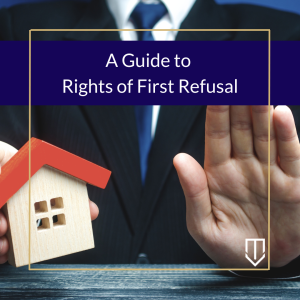 A right of first refusal – sometimes called a “preemptive right” – is a right provided by contract that gives a party priority to purchase a property if the owner decides to sell. This right may be included in an ownership agreement between two co-owners who are cotenants. The person who holds the right is the “grantee,” and the person who gives the right to a fellow co-owner is the “grantor.”
A right of first refusal – sometimes called a “preemptive right” – is a right provided by contract that gives a party priority to purchase a property if the owner decides to sell. This right may be included in an ownership agreement between two co-owners who are cotenants. The person who holds the right is the “grantee,” and the person who gives the right to a fellow co-owner is the “grantor.”
A right of first refusal gives the cotenant priority over other potential buyers when the other cotenant makes a decision to sell their interest in the property. Unlike a valid option provision where a cotenant is obligated to sell the property to the other cotenant subject to the terms of the ownership agreement, under a right of first refusal, a second cotenant’s ability to purchase the first cotenant’s interest depends on the first cotenant’s desire to sell it. The right of first refusal becomes an option when the owner “voluntarily decides to sell the property and receives a bona fide offer to purchase it from a third party.” (Campbell v. Alger (1999) 71 Cal.App.4th 200, 206-207.)
What types of instruments contain a right of first refusal?
 California Partition Law Blog
California Partition Law Blog


 Generally, every owner of property is liable for injuries on their property when it is not in a reasonably safe condition. (Cody F. v. Falletti (2001) 92 Cal.App.4th 1232.) If a party was a
Generally, every owner of property is liable for injuries on their property when it is not in a reasonably safe condition. (Cody F. v. Falletti (2001) 92 Cal.App.4th 1232.) If a party was a  An estate is categorized by the duration of time one holds an interest in the estate. For example, an estate acquired through inheritance is categorized differently from an estate for years. There are three different ways an estate can be categorized, which is codified in California Civil Code section 765. Essentially, section 765 categorizes an estate based on the character of the property.
An estate is categorized by the duration of time one holds an interest in the estate. For example, an estate acquired through inheritance is categorized differently from an estate for years. There are three different ways an estate can be categorized, which is codified in California Civil Code section 765. Essentially, section 765 categorizes an estate based on the character of the property.